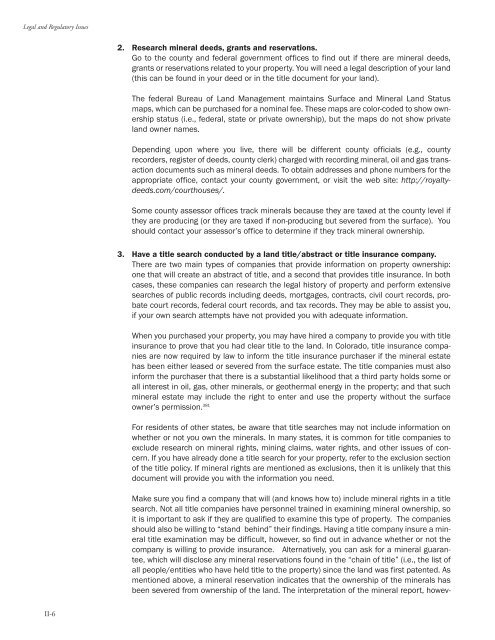Oil and Gas at Your Door? (2005 Edition) - Earthworks
Oil and Gas at Your Door? (2005 Edition) - Earthworks
Oil and Gas at Your Door? (2005 Edition) - Earthworks
You also want an ePaper? Increase the reach of your titles
YUMPU automatically turns print PDFs into web optimized ePapers that Google loves.
Legal <strong>and</strong> Regul<strong>at</strong>ory Issues<br />
2. Research mineral deeds, grants <strong>and</strong> reserv<strong>at</strong>ions.<br />
Go to the county <strong>and</strong> federal government offices to find out if there are mineral deeds,<br />
grants or reserv<strong>at</strong>ions rel<strong>at</strong>ed to your property. You will need a legal description of your l<strong>and</strong><br />
(this can be found in your deed or in the title document for your l<strong>and</strong>).<br />
The federal Bureau of L<strong>and</strong> Management maintains Surface <strong>and</strong> Mineral L<strong>and</strong> St<strong>at</strong>us<br />
maps, which can be purchased for a nominal fee. These maps are color-coded to show ownership<br />
st<strong>at</strong>us (i.e., federal, st<strong>at</strong>e or priv<strong>at</strong>e ownership), but the maps do not show priv<strong>at</strong>e<br />
l<strong>and</strong> owner names.<br />
Depending upon where you live, there will be different county officials (e.g., county<br />
recorders, register of deeds, county clerk) charged with recording mineral, oil <strong>and</strong> gas transaction<br />
documents such as mineral deeds. To obtain addresses <strong>and</strong> phone numbers for the<br />
appropri<strong>at</strong>e office, contact your county government, or visit the web site: http://royaltydeeds.com/courthouses/.<br />
Some county assessor offices track minerals because they are taxed <strong>at</strong> the county level if<br />
they are producing (or they are taxed if non-producing but severed from the surface). You<br />
should contact your assessor’s office to determine if they track mineral ownership.<br />
3. Have a title search conducted by a l<strong>and</strong> title/abstract or title insurance company.<br />
There are two main types of companies th<strong>at</strong> provide inform<strong>at</strong>ion on property ownership:<br />
one th<strong>at</strong> will cre<strong>at</strong>e an abstract of title, <strong>and</strong> a second th<strong>at</strong> provides title insurance. In both<br />
cases, these companies can research the legal history of property <strong>and</strong> perform extensive<br />
searches of public records including deeds, mortgages, contracts, civil court records, prob<strong>at</strong>e<br />
court records, federal court records, <strong>and</strong> tax records. They may be able to assist you,<br />
if your own search <strong>at</strong>tempts have not provided you with adequ<strong>at</strong>e inform<strong>at</strong>ion.<br />
When you purchased your property, you may have hired a company to provide you with title<br />
insurance to prove th<strong>at</strong> you had clear title to the l<strong>and</strong>. In Colorado, title insurance companies<br />
are now required by law to inform the title insurance purchaser if the mineral est<strong>at</strong>e<br />
has been either leased or severed from the surface est<strong>at</strong>e. The title companies must also<br />
inform the purchaser th<strong>at</strong> there is a substantial likelihood th<strong>at</strong> a third party holds some or<br />
all interest in oil, gas, other minerals, or geothermal energy in the property; <strong>and</strong> th<strong>at</strong> such<br />
mineral est<strong>at</strong>e may include the right to enter <strong>and</strong> use the property without the surface<br />
owner’s permission. 381<br />
For residents of other st<strong>at</strong>es, be aware th<strong>at</strong> title searches may not include inform<strong>at</strong>ion on<br />
whether or not you own the minerals. In many st<strong>at</strong>es, it is common for title companies to<br />
exclude research on mineral rights, mining claims, w<strong>at</strong>er rights, <strong>and</strong> other issues of concern.<br />
If you have already done a title search for your property, refer to the exclusion section<br />
of the title policy. If mineral rights are mentioned as exclusions, then it is unlikely th<strong>at</strong> this<br />
document will provide you with the inform<strong>at</strong>ion you need.<br />
Make sure you find a company th<strong>at</strong> will (<strong>and</strong> knows how to) include mineral rights in a title<br />
search. Not all title companies have personnel trained in examining mineral ownership, so<br />
it is important to ask if they are qualified to examine this type of property. The companies<br />
should also be willing to “st<strong>and</strong> behind” their findings. Having a title company insure a mineral<br />
title examin<strong>at</strong>ion may be difficult, however, so find out in advance whether or not the<br />
company is willing to provide insurance. Altern<strong>at</strong>ively, you can ask for a mineral guarantee,<br />
which will disclose any mineral reserv<strong>at</strong>ions found in the “chain of title” (i.e., the list of<br />
all people/entities who have held title to the property) since the l<strong>and</strong> was first p<strong>at</strong>ented. As<br />
mentioned above, a mineral reserv<strong>at</strong>ion indic<strong>at</strong>es th<strong>at</strong> the ownership of the minerals has<br />
been severed from ownership of the l<strong>and</strong>. The interpret<strong>at</strong>ion of the mineral report, howev-<br />
II-6




